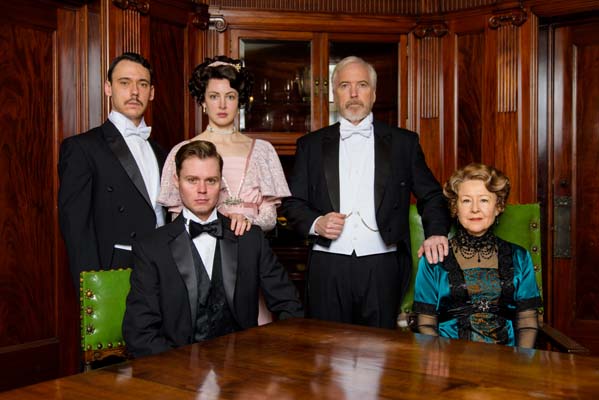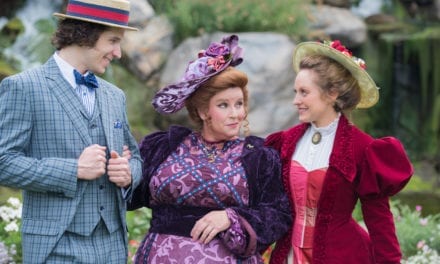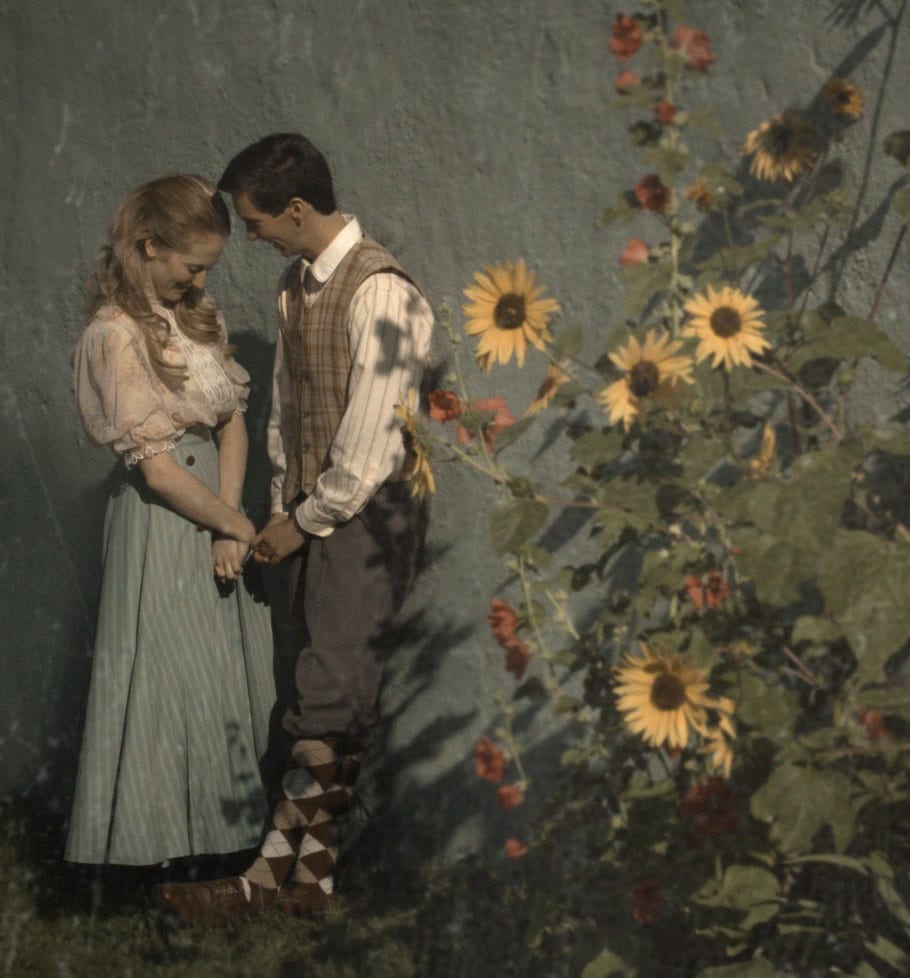SALT LAKE CITY — Edwardian England is often painted as a romantic time of peace and rapid progress; a cozy lull between rigid Victorianism and the horror of the first World War where the class divide was vast but innocuous and technology was considered unstoppable. Audiences have since been exposed to the truth of these charming historical fallacies in movies like Titanic and television shows like Mr. Selfridge and the beloved Downton Abbey. Pioneer Theatre Company’s production of An Inspector Calls by J. B. Priestley has all of the lavish trappings of the Crawley estate mixed with the classic mystery components of an Agatha Christie novel and a surprisingly subversive yet relevant theme that ultimately provides a very fascinating night of theatre.

Show closes March 5, 2016.
It is April 1912, in the fictional industrial town of Brumley, England. The wealthy Birling family is celebrating the engagement of daughter Sheila to Gerald Croft, the son of a noble family and patriarch Arthur Birling’s main manufacturing competitor. The family is thrilled. The union will be a social occasion that provides introduction to a “better” class of society, a rung up on the social ladder, and a brand merger enviable even under 21st century standards. The family goes through the prescribed motions of a celebratory dinner, the action confined to the gilded dining room, each fulfilling their expected roles. Arthur is blustery and terse, a proponent of the technological age—so long as costs remain low and profits high. His daughter’s engagement is as much a business deal as it is a milestone. His wife, Sybil, is elegant and slightly more refined than her husband. Her straight backed adherence to etiquette is quietly deadly towards her husband’s missteps and her daughter’s grasps at modernity while blindingly ignorant to her son’s extensive drinking. Sheila is the epitome of a desirable debutante, all acquiescence and flattering tittering to her betrothed—except when she breaks ranks and asks her beau to explain a brief disappearance, much to her mother’s horror. Gerald is posh and dapper, with a hint of reformed cad, equally keen to make a society approved match as well as a good business arrangement. Young Eric Birling is an unabashed rake, a prototypical “Bright Young Thing” bent on excess, but surprisingly observant when it comes to class disparity.

Left to Right: John Skelley as Gerald Croft, John Evans Reese as Eric Birling, Katie Wieland as Sheila Birling, Joseph Dellger as Arthur Birling, and Mia Dillon as Sybil Birling. Photo by Alexander Weisman.
It all seems fairly standard for a three act English drawing room drama. Enter Inspector Goole. He has some questions about the death of a lower-class young woman, all of whom the dining party swear they could not possibly know. Undeterred, Inspector Goole begins a methodical moral audit that soon reveals the intricate ways in which the lives of the characters and the dead girl do indeed intertwine.
There isn’t much subtlety to Inspector Goole’s interrogations, nor in the family’s adamant denials. Goole warns of the undesirable reality of mechanized progress and the consequences of willful ignorance without consideration to reputation or social niceties. The truth ripples through the family, destroying all the artful edifices that privilege and wealth require. Watching these reveals becomes the true show, as the family is put through their paces in turn. Director Mary B. Robinson uses the dining room setting to help reveal the story without the action becoming static. Lush costumes by Carol Wells-Day supported by stunning wigs by Amanda French, an ornate set by Jason Simms, and Phil Monat‘s “warm noir” lighting give immediate life to the historical setting. Robinson’s direction teases out subtlety in the performances to provide a stark counterpoint to the blatant message of the text.

Christopher Kelly as Inspector Goole and Mia Dillon as Sybil Birling. Photo by Alexander Weisman.
Joseph Dellger plays Arthur as every inch the corporate magnate, a little impressed with his own importance and with a close eye on the bottom line. He is almost endearing with his “can-d0” attitude, until he starts preaching the evils of labor unions and is more horrified at the idea of stolen money than loss of life. Mia Dillon as Sybil is the most unnerving. Dillon makes Sybil the pinnacle of womanhood, yet there is an underlying venom, as she spits her denials to Goole. Her fervent dismissal and ultimate realization of an intimate connection to the dead girl will break audience hearts and turn stomachs.

Joseph Dellger as Arthur Birling. Photo by Alexander Weisman.
John Skelley as Gerald and John Evans Reese as young Eric are at turns charming, disgusting, and pitiable as men guilty of then acceptable boorish behavior. Reese imbues Eric with a genuine remorse that ultimately helps prove Eric redeemable. Katie Wieland, as Shelia, has the most interesting character reversal. Wieland plays up on Sheila’s intelligence, not allowing it to be totally quashed by the expectations of her parents before Goole arrives, and using it as she transforms into a de facto Greek chorus, guiding the audience to make sense of Goole’s revelations.
Christopher Kelly dominates the space as Goole, forcing a shift in balance as he approaches each suspect. Goole’s lines could easily become obscenely melodramatic, but Kelly delivers them with such reason and compassion that I could not help but be swayed. He doesn’t exactly have Columbo’s signature “just one more thing,” but there is that level of predictability and appeal that makes Goole utterly compelling. Goole is part personified conscience and part avenging spirit. Just before he leaves the stage, Goole says “We are members of one body. We are responsible for each other. And I tell you that the time will soon come when, if men will not learn that lesson, they will be taught it in fire and blood and anguish.” This speech is framed by a mute chorus of factory girls, any or all of which could have suffered the same fate as the one the good inspector is investigating. I immediately thought of when Ebeneezer Scrooge is confronted at the end of his time with the Ghost of Christmas Present with Ignorance and Want. As stated elsewhere in current popular culture, “When confronted with an unpleasant truth, you can continue denying that truth or you can do something about it.” After Goole leaves and his very existence comes in to question, the characters must make this very choice.
The formula is so well-known now as to be iconic, but in 1945 Priestly used the now ubiquitous well-spoken but lower class detective as a means to communicate some scathing social commentary. The play was originally so controversial that the story’s “Marxist” themes prevented a West End debut in London and opened in Lenningrad instead. Today, it is considered one of “English socialism’s sacred texts.” It is that commentary that really makes the piece so interesting. Priestly writes about a time before both world wars as a criticism of how little had changed after such defining events. Part political fable and part allegory, this is a piece that has withstood the ravages of time well. It is jarring to see how relevant these condemnations are in a modern context. The message is possibly more true in the current political climate, the irony of which provided moments of dark humor that garnered uncomfortable laughter. The play asks big, uncomfortable questions and—like the Birling family—the audience must choose what they do with the answers.






